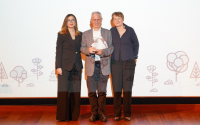23 September 2006
Seventeen years after giving up my car, I still feel like a second-class citizen. I am trying to do the right thing, but the United Kingdom just isn't run for people like me.
Take our bus services. My home city, Oxford, has invested massively in a park-and-ride scheme: buses shuttle people into the centre from car parks on the periphery. At first I thought this was a great idea. Now, having stood for what must amount to weeks at bus stops, watching the double deckers go by every couple of minutes without stopping, I realise it's not just the roads which have been monopolised by drivers, but also the public transport system.
Or take the bike lanes. Most consist of lines painted on the road where it is wide and safe, which disappear as soon as it becomes narrow and dangerous. One of them, in Oxford, has been gravelled, which shows that the people who designed them have never ridden a bicycle. When we asked for proper lanes on one of the city's busiest streets, the council chose instead to narrow it and widen the pavements, in the hope that the bicycles would slow down the cars. The cyclists, perversely reluctant to become human speed bumps, started travelling down the pavement.
Now there is almost nowhere reserved for people like me. Out of political power. Our demands are counter-aspirational, and therefore of little interest to either politicians or the media.
Now, to my horror, I find I am beginning to question even the environmental impact of my 17 years of abstinence. It is true that my own carbon emissions have been suppressed. It is also true that if everyone did the same thing the total saving would be enormous. The problem is that, in the absence of regulation, traffic expands to fill the available space.
By refusing to own a car I have merely opened up road space for other people, who tend to drive more fuel-hungry models than I would have chosen. We can do little to reduce our impacts on the environment if the government won't support us.
There are some compensations, however. About three or four times a year I hire a car. When I stop at motorway service stations, I am struck by the staggering levels of obesity: it appears to be far more prevalent there than on trains or coaches. People who take public transport must at least walk to the bus stop. The cyclists among us keep fit without even noticing.
Being without a car has forced me to embed myself in my home town. It throws me into contact with far more people than I would otherwise meet. There are a couple of routes which make cycling a real pleasure: the towpath along the Thames, for example, takes me most of the way to the station.
But overall, as far as self-interest is concerned, I would struggle to claim that giving up my car was a wholly positive decision.
· George Monbiot's book Heat: How To Stop The Planet Burning is published by Penguin on September 28.
http://environment.guardian.co.uk/travel/story/0,,1875371,00.html






